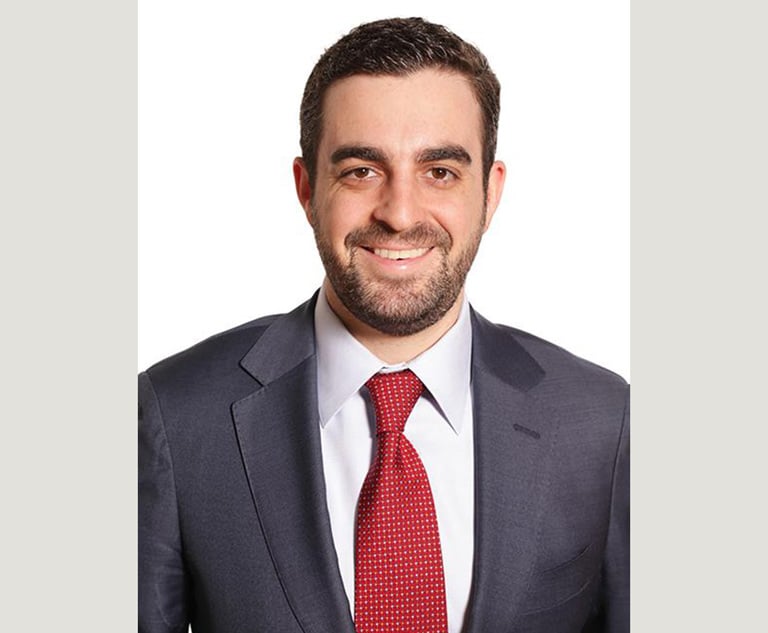 Photo: Shutterstock
Photo: ShutterstockICE Detainees Entitled to Evidentiary Hearing Over Traffic Stop, 3rd Circuit Rules
A federal appeals court has ruled that a pair of undocumented immigrants stopped for speeding in Pennsylvania should have had the chance to present a case that the evidence used to start deportation proceedings against them was gathered unconstitutionally.
July 31, 2019 at 02:11 PM
3 minute read
A federal appeals court has ruled that a pair of undocumented immigrants stopped for speeding in Pennsylvania should have had the chance to present a case that the evidence used to start deportation proceedings against them was gathered unconstitutionally.
The U.S. Court of Appeals for the Third Circuit upended the Bureau of Immigration Appeals’ affirmance of an immigration judge’s denial of a request for an evidentiary hearing filed by Guatemalan nationals Erick Geovany Yoc-Us and Luis Calel-Espantzay.
According to Third Circuit Judge Marjorie Rendell’s Wednesday precedential opinion, Pennsylvania State Trooper Luke C. Macke pulled over the van in which the two were traveling as passengers. Macke cited speeding as the reason for the stop, but then began interrogating the passengers as to their immigration status. When they were unable to produce identification, Macke called Immigration and Customs Enforcement.
ICE took the men into custody and eventually transferred them to a county prison. Deportation proceedings were initiated, but Yoc-Us and Espantzay argued that the arrest violated their Fourth Amendment rights. The immigration judge ruled that they failed to make a case that an egregious violation occurred, and the BIA upheld that ruling.
However, the Third Circuit found there was evidence that a constitutional violation occurred, and that the two undocumented immigrants were wrongly denied a hearing to determine the constitutionality of the evidence against them.
“Although Macke was justified in initially stopping the van for speeding, the record supports petitioners’ allegations that their Fourth Amendment rights were violated when Macke unreasonably extended the stop to investigate their immigration status,” Rendell wrote.
The question then shifted to whether the petitioners’ allegations were strong enough to merit an evidentiary hearing.
“We do not agree with the IJ and the BIA that petitioners failed to allege a potentially egregious Fourth Amendment violation that would warrant an evidentiary hearing,” Rendell said. “First, as we determined above, Macke’s extension of the stop was unreasonable and in violation of the Fourth Amendment. Second, petitioners’ allegations, if true, may show an egregious Fourth Amendment violation that would warrant application of the exclusionary rule because, as noted above, we specifically stated in [Oliva-Ramos v. Attorney General] that ‘whether any seizures or arrests were based on race or perceived ethnicity’ was a consideration in determining whether an egregious Fourth Amendment violation had occurred.”
The Department of Justice did not respond to a request for comment on the decision.
The petitioners are represented by Joanna Cline of Pepper Hamilton in Philadelphia, who said “We’re pleased that the court has vacated the BIA’s orders.”
This content has been archived. It is available through our partners, LexisNexis® and Bloomberg Law.
To view this content, please continue to their sites.
Not a Lexis Subscriber?
Subscribe Now
Not a Bloomberg Law Subscriber?
Subscribe Now
NOT FOR REPRINT
© 2024 ALM Global, LLC, All Rights Reserved. Request academic re-use from www.copyright.com. All other uses, submit a request to [email protected]. For more information visit Asset & Logo Licensing.
You Might Like
View All
Phila. Jury Hits Sig Sauer With $11M Verdict Over Alleged Gun Defect
3 minute read

Judge Approves $1.15M Settlement, Reduces Attorney Award in COVID-19 Tuition Reimbursement Suit
4 minute read
Dechert 'Spark Tank' Competition Encourages Firmwide Innovation Focus
Trending Stories
- 1Immigration Under the Trump Administration: Five Things to Expect in the First 90 Days
- 2'Radical Left Judges'?: Trump Demands GOP Unity Against Biden's Judicial Picks
- 3NY District Attorneys Are Still No Fans of Revamped Misconduct Watchdog
- 4ICC Issues Arrest Warrants for Israel's Prime Minister Over Alleged War Crimes in Gaza
- 5Attorney Responds to Outten & Golden Managing Partner's Letter on Dropped Client
Who Got The Work
Michael G. Bongiorno, Andrew Scott Dulberg and Elizabeth E. Driscoll from Wilmer Cutler Pickering Hale and Dorr have stepped in to represent Symbotic Inc., an A.I.-enabled technology platform that focuses on increasing supply chain efficiency, and other defendants in a pending shareholder derivative lawsuit. The case, filed Oct. 2 in Massachusetts District Court by the Brown Law Firm on behalf of Stephen Austen, accuses certain officers and directors of misleading investors in regard to Symbotic's potential for margin growth by failing to disclose that the company was not equipped to timely deploy its systems or manage expenses through project delays. The case, assigned to U.S. District Judge Nathaniel M. Gorton, is 1:24-cv-12522, Austen v. Cohen et al.
Who Got The Work
Edmund Polubinski and Marie Killmond of Davis Polk & Wardwell have entered appearances for data platform software development company MongoDB and other defendants in a pending shareholder derivative lawsuit. The action, filed Oct. 7 in New York Southern District Court by the Brown Law Firm, accuses the company's directors and/or officers of falsely expressing confidence in the company’s restructuring of its sales incentive plan and downplaying the severity of decreases in its upfront commitments. The case is 1:24-cv-07594, Roy v. Ittycheria et al.
Who Got The Work
Amy O. Bruchs and Kurt F. Ellison of Michael Best & Friedrich have entered appearances for Epic Systems Corp. in a pending employment discrimination lawsuit. The suit was filed Sept. 7 in Wisconsin Western District Court by Levine Eisberner LLC and Siri & Glimstad on behalf of a project manager who claims that he was wrongfully terminated after applying for a religious exemption to the defendant's COVID-19 vaccine mandate. The case, assigned to U.S. Magistrate Judge Anita Marie Boor, is 3:24-cv-00630, Secker, Nathan v. Epic Systems Corporation.
Who Got The Work
David X. Sullivan, Thomas J. Finn and Gregory A. Hall from McCarter & English have entered appearances for Sunrun Installation Services in a pending civil rights lawsuit. The complaint was filed Sept. 4 in Connecticut District Court by attorney Robert M. Berke on behalf of former employee George Edward Steins, who was arrested and charged with employing an unregistered home improvement salesperson. The complaint alleges that had Sunrun informed the Connecticut Department of Consumer Protection that the plaintiff's employment had ended in 2017 and that he no longer held Sunrun's home improvement contractor license, he would not have been hit with charges, which were dismissed in May 2024. The case, assigned to U.S. District Judge Jeffrey A. Meyer, is 3:24-cv-01423, Steins v. Sunrun, Inc. et al.
Who Got The Work
Greenberg Traurig shareholder Joshua L. Raskin has entered an appearance for boohoo.com UK Ltd. in a pending patent infringement lawsuit. The suit, filed Sept. 3 in Texas Eastern District Court by Rozier Hardt McDonough on behalf of Alto Dynamics, asserts five patents related to an online shopping platform. The case, assigned to U.S. District Judge Rodney Gilstrap, is 2:24-cv-00719, Alto Dynamics, LLC v. boohoo.com UK Limited.
Featured Firms
Law Offices of Gary Martin Hays & Associates, P.C.
(470) 294-1674
Law Offices of Mark E. Salomone
(857) 444-6468
Smith & Hassler
(713) 739-1250





